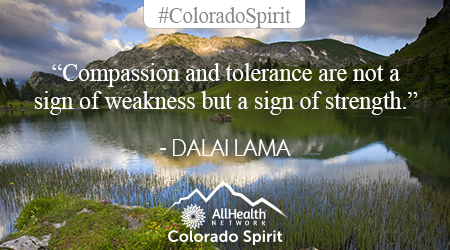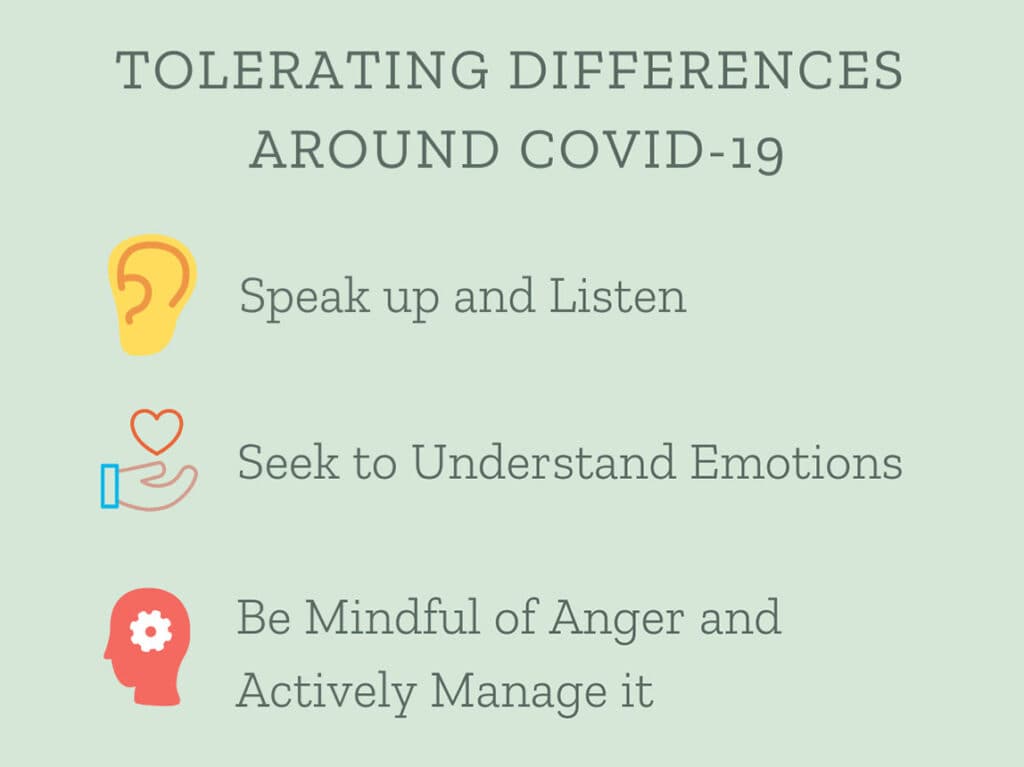As more businesses open and there is more mobility in various communities, many of us are noticing a growing tension – Disagreement.
If you look, it seems you can find disagreement on everything related to COVID-19. Whether it is assessment of risk, to wear a mask or not, or when large indoor gatherings should resume, you will find people with different views. Even more challenging, often the “experts” disagree.
While we can certainly make choices about how much of this division we attend to in the media or on social media, it can feel different when people close to us are in disagreement. It is one thing to stop reading the article that highlights views of those who see things differently than I do, but what happens when it is my partner, parent, friend, co-worker, or boss who disagrees with me?
Because we are all under high levels of stress right now, dealing with disagreement can feel extra challenging. Add to that the very real risks people are facing around both health and financial issues, and it can feel downright impossible to tolerate disagreement. Know that you are not alone in struggling with this.
Here are a few things to consider
Tension is understandable. As Dr. Laura B. Kasper explains, “We each want to have a sense of agency over our own life and choices (our autonomy), and the choice to share our life with someone else also means we’ve agreed to take their wants, needs, values, and beliefs into consideration (our dependency). This naturally creates tension when our feelings about what is important or risky differ from our partner’s feelings.” Read the rest of this article here. This dynamic can occur in all important relationships, not just those with a partner. Acknowledging that this tension is a natural part of many relationships can lessen the worry that there is something “really wrong” if disagreement occurs. Once we normalize what we are experiencing, discomfort can start to subside.
Speak up and listen. If you are comfortable, try talking to the person about the situation and your concerns. Work hard to use positive language, avoid blaming or judging, and to listen to the other person’s point of view. If the conversation gets heated, take a break and step away with a plan to talk more once things have settled down. This article lists some helpful tips for communicating with a partner, yet they are all great communication tips to use in any relationship!
take a break and step away with a plan to talk more once things have settled down. This article lists some helpful tips for communicating with a partner, yet they are all great communication tips to use in any relationship!
Seek to understand emotions. Currently, there is a great deal of fear and uncertainty. As humans, we can try to find ways to control a situation to manage this fear. The challenge with our current situation is that we really do not have control over a lot of factors. Some of us respond to this lack of control by digging in even more to the things we think we can control and being even more rigid. Additionally, the sadness and grief that so many of us are experiencing right now can lead some of us to embrace trying to find ways to move back to “normal” as quickly as possible.
Sometimes acknowledging our own and others’ fears, sadness, and grief can help us move past the disagreement.
If you don’t agree, can you set the disagreement aside? Is the disagreement causing risk to you or is it a difference of opinion? If you and your partner disagree about how much to socialize, you might need to work to find a compromise as this could lead to continued conflict around current behaviors. Do you and your friend disagree about when stay at home orders should have been put in place? That might be one you can let go of with the recognition that what has already happened cannot change and that continued discussion of this disagreement could cause harm to your relationship. What about disagreements about what leaders should do? Unless you are in a position to directly influence this, debating this with those close to you who disagree might do more damage to your relationship than good.
Be mindful of anger and actively manage it. Tempers are running high right now and anger is spilling out in lots of places. It is understandable that people are angry and frustrated. The challenge is that anger can be like a fire that is fueled by what we see and hear in the world around us. There is a real danger of displaced aggression right now when the sources of our anger are not accessible or when there is a power differential that makes expressing the anger impossible. This article dives into the dynamics of the pandemic that contribute to displaced anger and ways to deal with it.
Dealing with disagreements like this is hard! Make sure you have some trusted folks you can connect with to de-stress. Self-care, anxiety management, and distress tolerance skills that we have shared in prior posts can also help us sit with these differences.
In the end…
We know there are no easy ways to navigate the strain you may be experiencing in relationships due to differences in views about responses, so we encourage you to be gentle with yourself and others, continue to educate yourself using trusted resources about the current best practice recommendations, and to reach out to connect.
Would speaking to someone help?
AllHealth Network, along with other community mental health centers, is continuing to provide services via telehealth and by phone. Our Crisis Walk-in Center remains open 24/7 and offers in-person care to those experiencing a mental health crisis. For more information and to get connected with our services, please call 303-730-8858. To learn more about what other community mental health centers are doing, please visit the Colorado Behavioral Health Council COVID-19 website.
If you are experiencing a mental health crisis and are in need of immediate assistance, please call the Colorado Crisis Hotline at 1-844-493-TALK (8255) or text TALK to 38255
How do you know if you’re experiencing a mental health crisis? Click here to learn about mental health crisis warning signs to look out for from the National Alliance on Mental Illness (NAMI)


